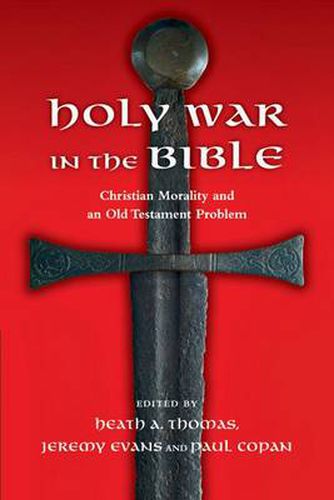Readings Newsletter
Become a Readings Member to make your shopping experience even easier.
Sign in or sign up for free!
You’re not far away from qualifying for FREE standard shipping within Australia
You’ve qualified for FREE standard shipping within Australia
The cart is loading…






This title is printed to order. This book may have been self-published. If so, we cannot guarantee the quality of the content. In the main most books will have gone through the editing process however some may not. We therefore suggest that you be aware of this before ordering this book. If in doubt check either the author or publisher’s details as we are unable to accept any returns unless they are faulty. Please contact us if you have any questions.
The challenge of a seemingly genocidal God who commands ruthless warfare has bewildered Bible readers for generations. The theme of divine war is not limited to the Old Testament historical books, however. It is also prevalent in the prophets and wisdom literature as well. Still it doesn’t stop. The New Testament book of Revelation, too, is full of such imagery. Our questions multiply.
Why does God apparently tell Joshua to wipe out whole cities, tribes or nations? Is this yet another example of dogmatic religious conviction breeding violence? Did these texts help inspire or justify the Crusades? What impact do they have on Christian morality and just war theories today? How does divine warfare fit with Christ’s call to turn the other cheek ? Why does Paul employ warfare imagery in his letters? Do these texts warrant questioning the overall trustworthiness of the Bible?
These controversial yet theologically vital issues call for thorough interpretation, especially given a long history of misinterpretation and misappropriaton of these texts. This book does more, however. A range of expert contributors engage in a multidisciplinary approach that considers the issue from a variety of perspectives: biblical, ethical, philosophical and theological.
While the writers recognize that such a difficult and delicate topic cannot be resolved in a simplistic manner, the different threads of this book weave together a satisfying tapestry. Ultimately we find in the overarching biblical narrative a picture of divine redemption that shows the place of divine war in the salvific movement of God.
$9.00 standard shipping within Australia
FREE standard shipping within Australia for orders over $100.00
Express & International shipping calculated at checkout
This title is printed to order. This book may have been self-published. If so, we cannot guarantee the quality of the content. In the main most books will have gone through the editing process however some may not. We therefore suggest that you be aware of this before ordering this book. If in doubt check either the author or publisher’s details as we are unable to accept any returns unless they are faulty. Please contact us if you have any questions.
The challenge of a seemingly genocidal God who commands ruthless warfare has bewildered Bible readers for generations. The theme of divine war is not limited to the Old Testament historical books, however. It is also prevalent in the prophets and wisdom literature as well. Still it doesn’t stop. The New Testament book of Revelation, too, is full of such imagery. Our questions multiply.
Why does God apparently tell Joshua to wipe out whole cities, tribes or nations? Is this yet another example of dogmatic religious conviction breeding violence? Did these texts help inspire or justify the Crusades? What impact do they have on Christian morality and just war theories today? How does divine warfare fit with Christ’s call to turn the other cheek ? Why does Paul employ warfare imagery in his letters? Do these texts warrant questioning the overall trustworthiness of the Bible?
These controversial yet theologically vital issues call for thorough interpretation, especially given a long history of misinterpretation and misappropriaton of these texts. This book does more, however. A range of expert contributors engage in a multidisciplinary approach that considers the issue from a variety of perspectives: biblical, ethical, philosophical and theological.
While the writers recognize that such a difficult and delicate topic cannot be resolved in a simplistic manner, the different threads of this book weave together a satisfying tapestry. Ultimately we find in the overarching biblical narrative a picture of divine redemption that shows the place of divine war in the salvific movement of God.